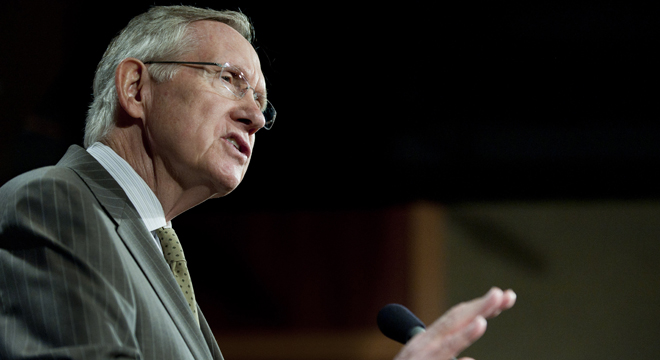Harry Reid’s recent antics took the political world by surprise for several reasons — but the biggest was that they didn’t match expectations.
Broadsiding Mitt Romney like Reid did calls to mind the aggressive tactics Lyndon Baines Johnson used to intimidate and defeat his political enemies — not the soft-spoken Democratic leader who led Senate Democrats haphazardly through President Obama’s first two years.
But 2009 and 2010 were unusual years for Reid.
The economy was a disaster, his legislative agenda was packed, and with his seat on the line in a GOP wave cycle, he’d fallen deeply out of favor with his constituents. People who’ve observed Reid for more than just the last three years recognize that Reid’s quiet public demeanor — and his struggles in 2009 and 2010 — belie a history of ruthlessness and cunning that mirror his insinuations about Mitt Romney’s tax returns.
“Anyone who thinks this is unusual for Reid should consult with one of the many political corpses he’s left by the wayside throughout the years,” said one Reid confidant.
Reid’s current and former aides discuss this latest gut punch with equal measures of pride and familiarity. And they recall many times over the past several years when Reid’s gone bare knuckled.
One of his craftiest moves came in 2005 amid howls of derision from conservatives and many liberals. President George W. Bush had nominated his lawyer, and constitutional naif, Harriet Miers to replace Sandra Day O’Connor on the Supreme Court, and the White House was under tremendous pressure to yank the nomination.
Reid surprised members of both parties by applauding her nomination. But Reid recognized two things party elites did not: the longer her nomination dragged on, the more damage the Republican Party would inflict upon itself; and if Miers were to be confirmed, she would likely be a more liberal justice than whomever Bush nominated in her stead.
He only partially won the fight, but his political judgment was vindicated. Bush withdrew her nomination after suffering a stinging rebuke from conservatives — and nominated the dependably conservative Samuel Alito instead.
“The radical right wing of the Republican Party killed the Harriet Miers nomination,” Reid said at the time. “Apparently, Ms. Miers did not satisfy those who want to pack the Supreme Court with rigid ideologues.”
In 2010, with his political life on the line, Reid manipulated the GOP Senate primary in Nevada to destroy the hopes of his strongest potential rival, Sue Lowden. Reid exploited her missteps — including one particularly damaging gaffe in which she imagined a return to bartering for medical services — on his way to picking his ultimate opponent: the fluoridated water conspiracist Sharon Angle, whom he narrowly defeated at the polls.
“It’s not new for Harry Reid to get himself involved in these kinds of things,” says Robert Uithoven, a strategist, who managed Lowden’s campaign. “I think this one was a bit more purposeful than some of the other gaffes he’s had in his career. … He’s not new to controversy. These kind of things haven’t kept him from getting re-elected every six years. And I think he views his role as a party leader in the presidential cycle as an attack dog. He’ll go out there and say things the president can’t say, because he has such a razor thin margin and is trying to protect his lead in battleground states.”
Reid’s comfortable as a more straightforward attack dog, too.
He called President Bush a “loser” — an attack he later apologized for — and, twice, a liar — a characterization he defends to this day. In 2005, he called then Fed chairman Alan Greenspan a “political hack,” for sitting on his hands while Republicans ran up large deficits, and blessing Bush’s Social Security privatization plan.
Reid called Justice Clarence Thomas an “embarrassment to the Supreme Court.” And most recently he unloaded on Bill Magwood, a Democratic member of the Nuclear Regulatory commission, calling him “one of the most unethical, prevaricating, incompetent people I’ve ever dealt with.”
So this Romney stuff? Vintage Reid. For one former aide, the only problem with this most recent gambit and others is that his handlers haven’t managed them well.
Staffers, the former aide said, “have hidden him somewhat, and that’s unfortunate. His legacy has not been handled as well as it could have been. Reid is a brilliant tactician. If people knew him better, the numbers on it [and the Romney dustup] would be different.”






